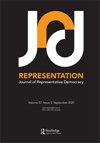covid -19相关阴谋的意识形态倾向。极右翼的新阵地?
Q2 Social Sciences
引用次数: 3
摘要
摘要是什么让新冠肺炎相关阴谋故事的信徒与通常的阴谋论者不同?迄今为止,关于新冠肺炎阴谋信仰的证据很少,而且只集中在少数几个国家。此外,它忽视了政治和意识形态因素,这些因素很可能有助于阻止对疫情的误解并理解其政治后果。本研究报告探讨了这些解释因素(左右比例、威权主义、自由和对现任党的支持)在一般阴谋论中的作用,尤其是与新冠肺炎相关的阴谋信仰。为此,它使用了一个新的案例研究:西班牙。根据大型在线调查(N = 3760),我们发现右翼个人比一般阴谋更倾向于接受新冠病毒特异性。我们还发现,重视安全而非自由的人更容易陷入对疫情的误解。那些持有更普遍阴谋信仰的人因捍卫自由而脱颖而出,也因反抗包括执政党在内的权威而脱颖而出。这表明,新冠疫情激发了一种新的阴谋论信徒:一种可能对新兴极右翼政党有吸引力的保守派。本文章由计算机程序翻译,如有差异,请以英文原文为准。
The Ideological Slant of COVID-19-Related Conspiracies. A New Niche for the Far-Right?
ABSTRACT What makes believers in COVID-19-related conspiratorial stories different from the usual conspiracy theorists? To date, evidence on conspiratorial beliefs about COVID-19 is scant and it focuses on only a few countries. Moreover, it overlooks political and ideological factors, which might well help in the endeavour of halting misperceptions about the pandemic and understanding their political consequences. This research note examines the role of these explanatory factors (placement on the left-right scale, authoritarianism, freedom, and support for the incumbent party) in relation to conspiracy theories in general and COVID-19-related conspiratorial beliefs in particular. To do so, it uses a new case study: Spain. Relying on a large online survey (N = 3760), we find that right-wing individuals are more prone to embrace COVID-19-specific than general conspiracies. We also find that people that value security over freedom are more prone to falling for pandemic misbeliefs. Those holding more general conspiratorial beliefs stand out for their defence of freedom above anything else, as well as for their rebellion against authority, including the ruling party. This suggests that the pandemic has roused a new sort of conspiratorial believer: a conservative niche that might become attractive to emerging far-right parties.
求助全文
通过发布文献求助,成功后即可免费获取论文全文。
去求助
来源期刊

Representation
Social Sciences-Sociology and Political Science
CiteScore
3.50
自引率
0.00%
发文量
31
期刊介绍:
This change in scope follows two paths. Firstly, it seeks contributors who are interested in exploring the interface between democratic practice and theory. In particular, this focus seeks contributions that apply theoretical insights to actual examples of current practice. Secondly, while not neglecting the current focus of the journal, we would like to expand its international coverage so that the journal will offer our readers insights in the state of democracy worldwide.
 求助内容:
求助内容: 应助结果提醒方式:
应助结果提醒方式:


